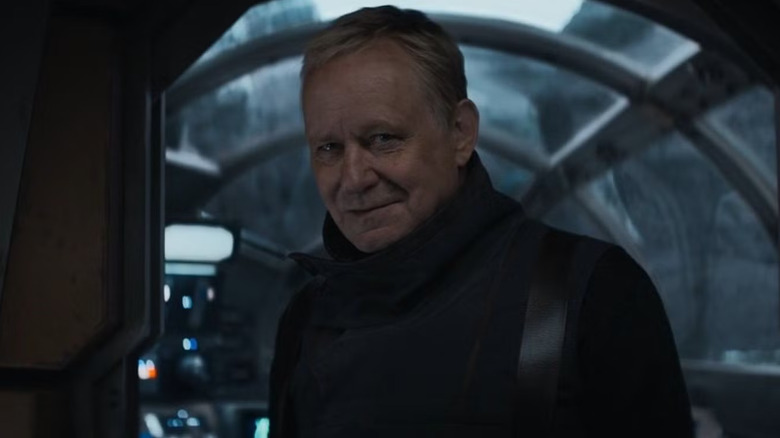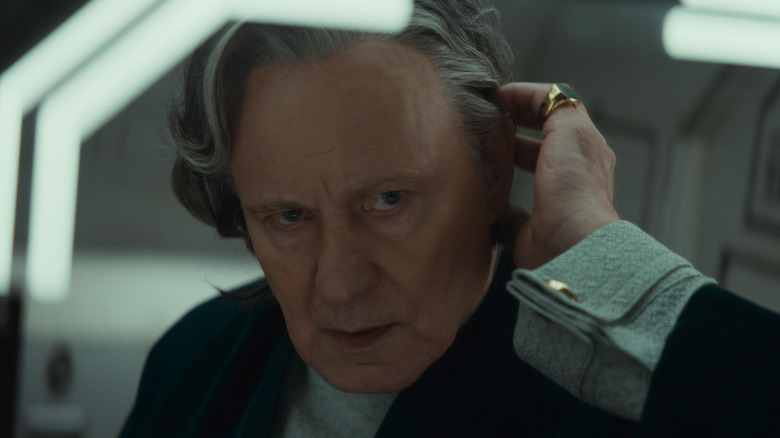Andor Season 2 Offers A Gripping Successor To The First Season's Best Moment
This article contains spoilers for "Andor."
When George Lucas' "Star Wars: Episode IV — A New Hope" was released in 1977, it gave generations of children dreams of joining the Rebel Alliance and fighting the forces of the evil Empire. By virtue of the fact that it was a two-hour movie, the notion that one could join the Rebels seemed fairly simple, and thus the fantasies they sparked were similarly unadorned. As the franchise has continued over the decades, this "good guys vs. bad guys" concept has continued to be developed, subverted, examined, and altogether deepened by a number of filmmakers, not the least of which was Lucas himself. As those generations of fans have grown up (well, as most of them have grown up, anyway), they, along with "Star Wars" itself, have come to realize that joining and/or starting a rebellion is no simple task.
That's why the monologue delivered by Luthen Rael (Stellan Skarsgǎrd) in season 1, episode 10 of Disney+'s "Andor" is one of the most vibrant and vital of the entire "Star Wars" franchise. It's not just that Skarsgård's performance is electric, nor is it that Rael's dialogue (written by Beau Willimon) is as good as anything Obi-Wan Kenobi or Yoda has ever said. It's that Rael, one of the architects of the Rebellion working tirelessly behind the scenes, is explaining to the audience via a Rebel spy within the Empire, Lonni Jung (Robert Emms), exactly what true political and moral conviction means. To sum up: it's not easy, it's not simple, it's not kind, and it has no reward. It's a monologue about the nature of sacrifice in general, yet it also brilliantly spells out one of the hardest truths: In order to actually make a better future, you must be willing to accept and understand the fact that you will never see it.
Thanks to the monologue being so well received, journalists have asked Skarsgård during the lead-up to "Andor" season 2 whether there might be a new monologue that Luthen will deliver, and the actor has pretty bluntly said that there will not be. While it's true that "Andor" does not tempt fate by trying to one-up that monologue, there is a moment in the new season which actively recalls it, and it's no surprise that it's one of the best scenes in the show.
Luthen reads Andor the Rebel act
In the sixth episode of "Andor" season 2 (titled "What a Festive Evening" and also written by Willimon), Cassian Andor (Diego Luna) confronts Luthen at the latter's antique shop front. Andor is furious that Luthen was previously attempting to suss out if Bix (Adria Arjona) might be fit to take on a mission for The Cause (as Disney+'s subtitles refer to the nascent Rebellion) despite her fragile mental state and burgeoning drug addiction. Even though Andor is in love with Bix, his fury also stems from Luthen's fanatical devotion to his work above all else. When confronted with this, Luthen throws Andor's former ultimatum of "Kill me or take me in" in his face and takes the opportunity to educate Andor on the hard realities of committing to a cause in similar fashion to how he explained himself to Jung in the previous season.
Although Luthen's rejoinder to Andor doesn't come in the form of a monologue but rather a heated dialogue between the two men, there's no question that this scene is a reprise of the moment from season 1, as it doubles down on Luthen's beliefs and further enlightens the more pragmatic and idealistic Andor. Even though Andor has undeniably been through some hard times and suffered great loss, his assertion that he has given Luthen "everything" does not impress a man who said "I burn my life to make a sunrise that I know I'll never see." To be fair, the scene isn't quite the show-stopping moment that Luthen's monologue was, but it is a key scene of the season (especially in retrospect of the season as a whole), and it gives Skarsgård some more wonderfully rich Willimon dialogue to chew on. In response to Andor's naive comment that those under Luthen's employ "are not droids," the cold, seen-it-all elder spy matter-of-factly replies, "We are not who we were when we started."
Luthen's commitment to his ethos is a Star Wars tradition
The scene occurring when it does — around the midpoint of the season — further underlines its status as a crux moment of the show. Although "Andor" is essentially an ensemble series, its title is not a misnomer, as the majority of the show is centered around not just Andor himself but also his ideological transformation from a scrappy thief into a man literally and figuratively willing to die for The Cause in "Rogue One." Luthen is Andor's mentor figure, and while he's but one of the many in "Star Wars," such characters tend to be rigid in their beliefs so as to better pass on their knowledge to their apprentices. (Think of Luke Skywalker and Obi-Wan Kenobi, Anakin Skywalker and Darth Sidious, Rey and Luke, and so forth.) It's within this frustrating rigidity that the emotionally torn apprentices find their own paths. Not coincidentally, this is a metaphor for parents and their children, too. Most of us struggle against our parents in our youth, and even though we do ironically grow up to be similar to them, we differentiate ourselves from them enough to ultimately become our own person.
So many people who adore "Andor" confess some variation of the sentiment that the show is making them love "Star Wars" again. The reason for this is that the writers and showrunners behind the series have a deep understanding of what "Star Wars" is about at its core, and the aforementioned Luthen scene is a sterling example of this understanding. As I said earlier, most young folks start out enjoying "Star Wars" for its surface-level attributes, and there's nothing wrong with that. Yet, beneath all the space battles and pulp fiction-inspired thrills lies a recurring morality play, one which Lucas cheekily codified with talk of a "light side" and "dark side" only to blur those lines later on.
"Star Wars" is a parable that constantly milks drama from underdog characters being forced to reckon with impossible obstacles, whether they're literal or ideological. Many of the Rebels in "Andor" come to the realization that they need Luthen, and it's ironic that "Andor" and "Star Wars" itself needs a Luthen in the same fashion — a character whose morality is debatable but who has nonetheless committed himself to a path. The way that this scene galvanizes both Andor and Luthen to react can already be seen in the rest of the episode itself, and it'll continue to resonate throughout the rest of the series. It may not be as showy as a monologue, but the scene is great drama, and it's great "Star Wars."
New episodes of "Andor" premiere Tuesdays at 9 p.m. EST on Disney+.


